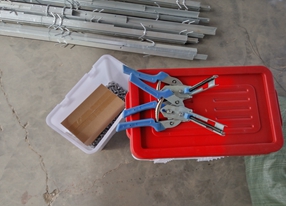Wire Mesh Solutions for Effective Chicken Cage Construction and Safety Mechanics
Nov . 10, 2024 20:38 Back to list
Wire Mesh Solutions for Effective Chicken Cage Construction and Safety Mechanics
Wire Mesh for Chicken Cages An Essential Component for Poultry Farming
In the world of poultry farming, providing a safe and comfortable environment for chickens is essential. One of the critical components that plays a vital role in ensuring the welfare of these birds is the use of wire mesh in chicken cages. This article delves into the importance, types, and benefits of wire mesh for chicken cages, making it clear why it is a fundamental aspect of successful poultry farming.
Understanding Wire Mesh
Wire mesh, often made from galvanized steel or stainless steel, consists of interconnected wires that form a grid-like structure. The design of wire mesh allows for excellent ventilation and visibility while also providing strength and durability. This makes it an ideal material for constructing chicken cages, as it protects the chickens from predators and harsh weather conditions while maintaining a healthy living environment.
Types of Wire Mesh
When it comes to selecting wire mesh for chicken cages, several options are available, each with its unique characteristics
1. Welded Wire Mesh This type is created by welding intersecting wire strands together, resulting in a robust and stable structure. Welded wire mesh is often used for permanent chicken coops, as it withstands wear and tear and is resistant to rust and corrosion.
2. Hexagonal Wire Mesh Commonly known as chicken wire, hexagonal wire mesh consists of thin wires twisted together to form a hexagon pattern. This type is often used in temporary structures and is ideal for enclosing outdoor runs. While it may not be as strong as welded wire, it is more flexible and easier to work with.
3. Chain Link Fencing Though traditionally used for larger enclosures, chain link fencing can also be adapted for chicken cages. It offers excellent visibility and ventilation while providing security against external threats. Chain link is particularly useful for free-range systems where chickens need larger spaces.
4. Stainless Steel Wire Mesh For a more premium option, stainless steel wire mesh offers outstanding durability and resistance to corrosion. While it can be more expensive, it is an excellent investment for long-term poultry farming operations. Stainless steel provides longevity and ensures that the cages remain hygienic over time.
wire mesh for chicken cages

Advantages of Using Wire Mesh in Chicken Cages
Wire mesh offers numerous benefits for both chickens and their caretakers
1. Safety and Security The primary advantage of wire mesh is its ability to keep chickens safe from predators, such as raccoons, foxes, and birds of prey. By enclosing the chickens in a secure environment, farmers can reduce the risk of loss.
2. Ventilation and Airflow Proper ventilation is crucial for the health of chickens. Wire mesh allows for adequate airflow, which helps regulate the temperature within the cage and reduces the risk of respiratory diseases. In contrast, solid walls can create stagnant air conditions, leading to discomfort for the birds.
3. Easy Maintenance Wire mesh cages are easy to clean and maintain. Their open design allows for quick access during cleaning, and waste can be easily removed. This simplifies maintaining hygiene, which is critical in preventing disease outbreaks.
4. Visibility Farmers can easily monitor the health and behavior of their flock through wire mesh. This visibility allows for prompt intervention if a chicken appears sick or injured.
5. Cost-Effectiveness When compared to alternative materials, wire mesh can be an economical choice for poultry farmers. Its durability reduces the need for frequent replacements, enabling long-term savings.
Conclusion
In summary, wire mesh is a fundamental element in the construction of chicken cages. Its various types offer flexibility for different farming needs, while its advantages contribute to the overall welfare of the chickens. By providing safety, proper ventilation, and ease of maintenance, wire mesh plays an indispensable role in modern poultry farming. For anyone considering raising chickens, investing in quality wire mesh for their cages is a decision that will lead to happier, healthier birds and a more successful farming operation. Whether for small-scale backyard coops or large commercial enterprises, wire mesh remains the backbone of chicken housing.
-
Automatic Feeding Line System Pan Feeder Nipple Drinker|Anping County Yize Metal Products Co., Ltd.
NewsJul.30,2025
-
Automatic Feeding Line System - Anping Yize|Pan Feeder,Nipple Drinker
NewsJul.30,2025
-
Automatic Feeding Line System - Anping County Yize Metal Products Co., Ltd.|Pan Feeder, Nipple Drinker
NewsJul.30,2025
-
Automatic Feeding Line System-Poultry Farming|Chicken Feeding&Watering
NewsJul.30,2025
-
Automatic Feeding Line System - Anping County Yize Metal Products Co., Ltd.|Pan Feeder Nipple Drinker,Broiler Farming
NewsJul.30,2025
-
Automatic Feeding Line System Pan Feeder Nipple Drinker-Anping County Yize Metal Products Co., Ltd.
NewsJul.30,2025






